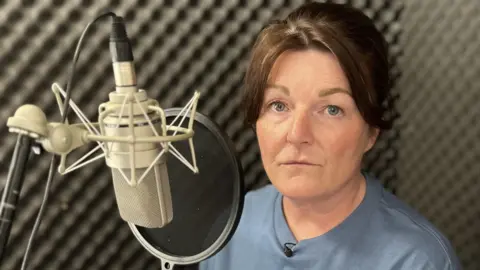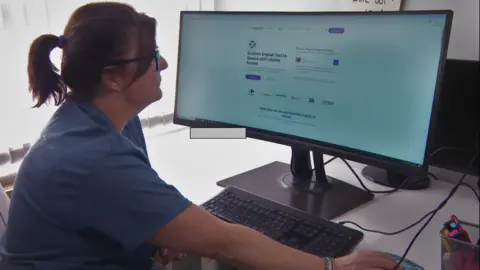'Stop using my voice' - New train announcer is my AI clone
 BBC
BBCA woman who believes her voice has been used to create ScotRail's new AI-generated announcement system is calling for it to be removed from trains.
ScotRail recently introduced a synthetic Scottish voice to make onboard announcements in place of pre-recorded human announcers.
Voiceover artist Gayanne Potter said the artificial announcer - which is marketed as an imaginary character called Iona - was trained by Swedish technology firm ReadSpeaker using her voice.
ReadSpeaker told BBC Scotland News it had already addressed Ms Potter's concerns "several times".
ScotRail said it had no plans to remove "Iona" and the dispute was between the company and the voiceover artist.
Ms Potter said she did some work for ReadSpeaker in 2021 which she was told would be used for accessibility and e-learning software.
But two years later, when the job was largely forgotten, a friend sent her a link to ReadSpeaker's website.
Ms Potter opened the page to find Iona - a text-to-speech programme marketed as a red haired woman standing in a Scottish glen.
"It is my voice - I'm absolutely certain it's my voice,” she said.
"I was horrified - the quality of it was dreadful."
 ScotRail
ScotRailLast week Ms Potter discovered the voice was being introduced across ScotRail after reading a BBC Scotland online story.
It told how some passengers had expressed unhappiness with the new artificial announcer.
One passenger said: "It was weird. I could tell it was AI because it sounded so robotic."
Ms Potter, who said she had been in dispute with ReadSpeaker for two years, revealed that after reading the online story she burst into tears.
"After the years that I've gone through to try to have my data removed - it's still being used," she said.
"I also have to look on social media and see people mocking it, berating it.
"They don't realise it's actually a real person who's been put through a dreadful voice app."
Ms Potter added: "It's hard enough for people in the creative industry to sustain careers but to be competing with a robotic version of yourself just adds insult to injury."
ReadSpeaker markets its products, including Iona, as an "AI voice generator," but it said all of its programmes are based on "human voice talent".
The firm uses a text-to-speech model, that means a user can type anything and Iona will read it out loud.
The technology uses artificial intelligence learning but AI needs something to learn from.
In this instance, it is voice recordings of an accent or language it is trying to emulate.
In response to the complaints, the tech firm said: "ReadSpeaker is aware of Ms Potter's concerns, and has comprehensively addressed these with Ms Potter's legal representative several times in the past."

Jennifer Cass, a partner at law firm Dentons, said there was a gap when it came to some protections against AI usage.
She said copyright extended to literary and artistic works but not "likeness or image".
"At the moment, there is no protection for image and voice in the UK," Ms Cass said.
"It is something that is being considered in the context of the AI copyright consultation which recently closed."
Ms Cass added: "There is a question about whether copyright should be expanded to cover likeness and image and to prevent the creation of digital replicas as well."
Historical contracts

Liam Budd is an industrial official for recorded media at UK trade union Equity, which represents 50,000 workers throughout the creative industries.
He said: "Sadly this is just one example of many performers who have their image or voice used to generate digital replicas without their full or informed consent.
"This is a real concern.
"Our members are effectively competing in a marketplace with AI systems that have been trained on their own image and voice without their consent.
"Their likeness is effectively being hijacked."

Ms Potter said that AI had developed massively in the past four years and a lot of historical contracts were not fit for purpose.
She added: "Why would I give my voice away that was going to do me out of work forever? That's nuts."
Ms Potter also believed that her work should be covered by GDPR - UK and EU data protection regulations - and that her consent should have been required for ReadSpeaker to sell a commercial programme.
She contacted the Information Commissioner's Office, the regulatory body which advises on data protection rights established by UK law.
But it said that the case was outside its jurisdiction as the data was controlled by ReadSpeaker.
Ms Potter said she was now asking her lawyers to approach ScotRail to request the announcements be removed.
She said: "If ScotRail want to do the right thing, I'm happy to do their voice announcements.
"At least I know how to say Milngavie."
